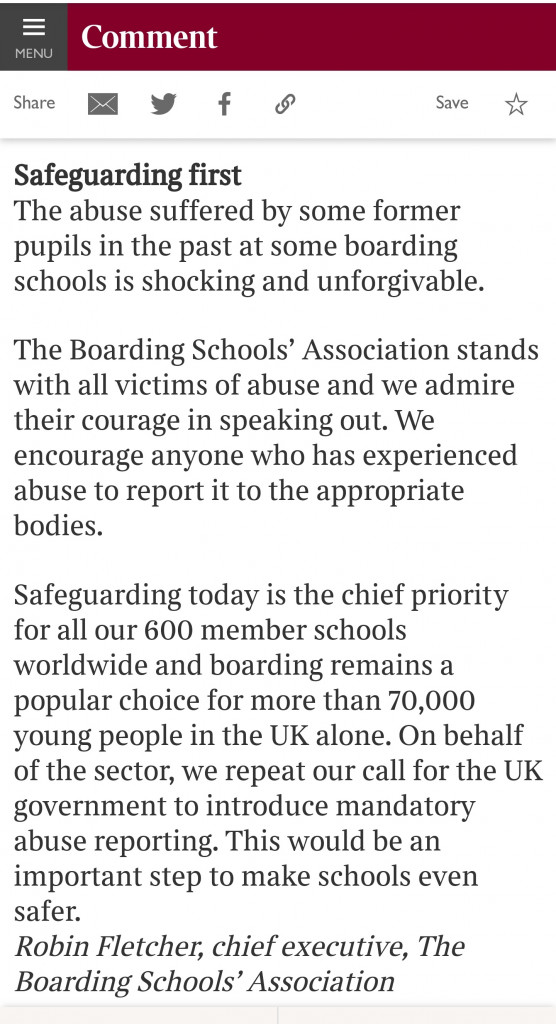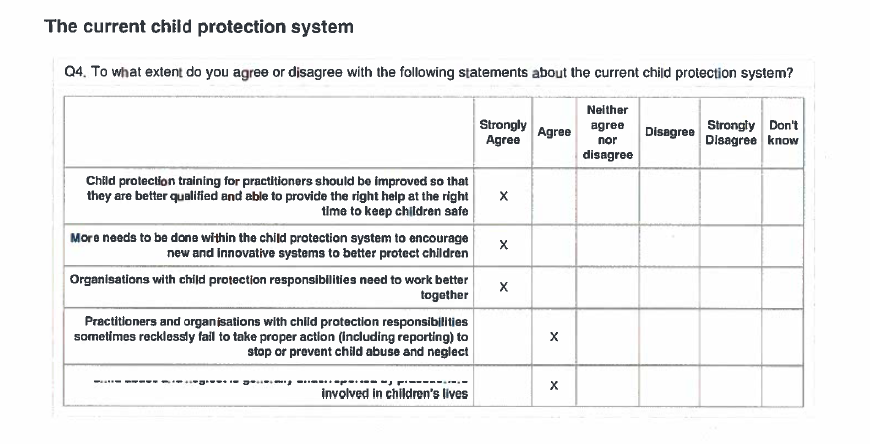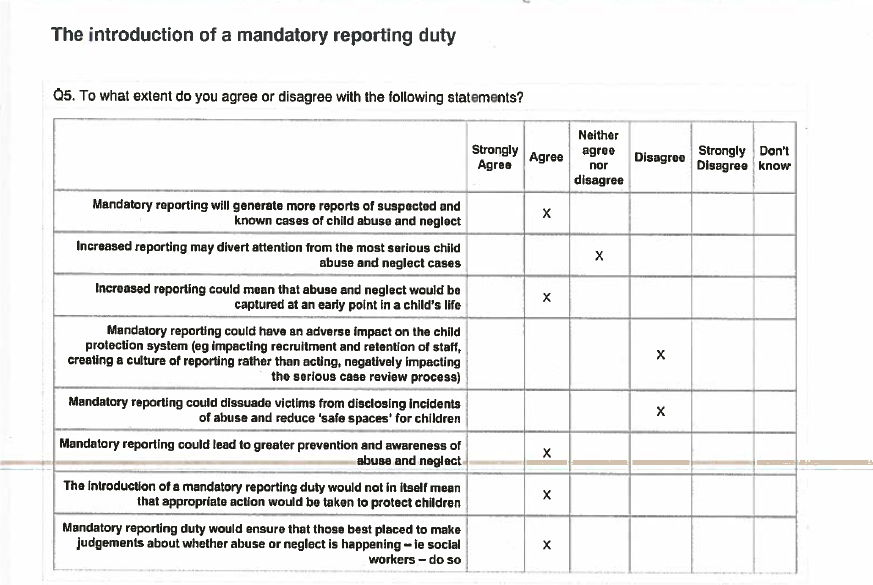In recent weeks the Sunday Times has run a series of articles about non-recent sexual and physical abuse in boarding schools. The articles stemmed from Louis de Bernières going public about the abusive time he had while a pupil at Grenham House in Birchington, Kent.
Here’s the first article, the second and the most recent from 02.05.21 is below:
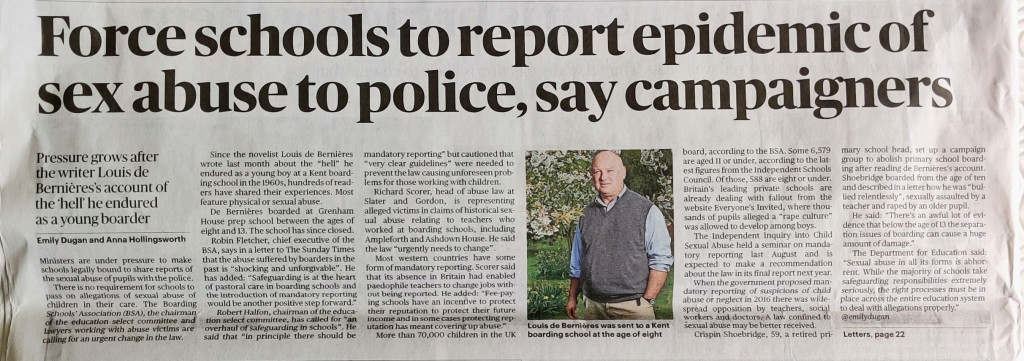
As you might imagine it caught our eye. To be picky we have always proposed that suspected abuse in the first instance is reported to the Local Authority Designated Officer (“LADO”). Child sexual abuse is rarely ‘known’ about and it’s important that the LADO triages all referrals from Regulated Activities. It’s also important to state that most jurisdictions in the rest of the world have some form of Mandatory Reporting (“MR”) – not just western countries as the Times article stated. And of course we do not propose that well-designed MR should apply to schools only, we want it across almost all Regulated Activities as this extract from our submission to the Reporting and Acting on Child Abuse and Neglect consultation (2016) details. The article hints that the Rt Hon Robert Halfon MP (Chair of the Education Select Committee) is unsure of his ground. Any politician who uses or almost uses the cliché ‘unforeseen/ (unintended) consequences’/ (circumstances) is hitting the brakes to stop further discussion. But why? Mandatory Reporting has been around a long time and there is plenty of data on the subject. It was first introduced to education in the State of Colorado in 1969 following the publication of a paper by Henry Kempe, a paediatrician, the first individual to recognize child abuse. He was nominated for the Nobel prize for his work in this field. His efforts led to the passage of the 1972 Colorado law requiring legal counsel for the child in all cases of suspected abuse – the first in the world. Now more than 81% of developed nations have some form of MR. England and Wales are outliers. The lack of MR here significantly contributed to the Independent Inquiry into Child Sexual Abuse (ICSA) being commissioned by Theresa May. Scotland also has ‘discretionary reporting’ of child abuse which also contributed to the commissioning of the Scottish Child Abuse Inquiry which has such a limited scope.
A particular point of interest in the Times piece was the repeat of a statement previously made by Robin Fletcher, the Chief Executive of the Boarding Schools Association, that it supported MR. The claim was reinforced by a letter to the editor published in the same edition.
Tom Perry of Mandate Now was invited to meet the BSA leadership team on 3rd November 2015. This followed the consultation being announced thanks to Baroness Walmsley’s Amendment 43 for the introduction of well-designed MR but before the documents were placed in the House on 21.07.16. It was a meeting that provided the BSA with the opportunity to ‘kick the tyres’ of MR to get a greater appreciation of the impact it has. For the BSA, well-designed MR should be an easy decision.
After the Home Office consultation concluded the BSA stated publicly it supported MR – but its members will quite understandably make their own decisions, surprisingly the BSA is not speaking on behalf of member schools. Furthermore MR is not ‘off the shelf’ legislation so it’s impossible to understand what the BSA, or anyone else means when the claim is made: ‘we support MR’.
Mandate Now was keen to find out so an email was sent to Robin Fletcher asking for a copy of the BSA’s submission. On 7th November 2016 we received a disappointing reply which of course prompted questions.
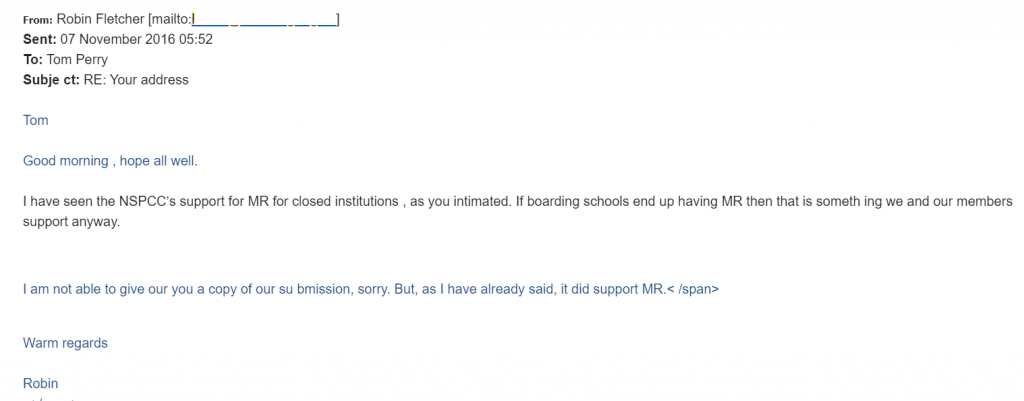
The NSPCC’s submission, mentioned in the BSA email, is relevant because it was thoroughly dysfunctional. In no way can it be described as mandatory reporting. Mis-labelling a bogus proposal and claiming it to be mandatory reporting is commonplace. We reviewed the NGO’s submission here. What a mess. Government has only the NSPCC and NGO’s similar to it to support the nonsense it will likely attempt to peddle following the final report from IICSA which is expected to recommend mandatory reporting. Empirical evidence and precedent won’t exist to support a counterfeit Government design so cue NSPCC, Barnardos, Lucy Faithfull et al which collectively have a such a symbiotic relationship with government. Barnardo’s for example.
Meanwhile Mandate Now submitted a Freedom of Information request to the Home Office for all the submissions to the consultation and we finally secured them thanks to a ruling in our favour by the Information Commissioners Office.
Submission 522 belongs to the BSA. It’s not functioning mandatory reporting. Here’s why :
The BSA (but not necessarily its members) broadly agrees that the status quo needs to be improved (Q4). It is broadly in favour of a mandatory reporting duty (Q5).
But further down the consultation it becomes clear that they have not understood the necessary elements to implement a well-designed MR scheme.
In Q17 they think accountability should be at the organisational rather than individual level, which means individuals trying to raise the alarm can be treated as whistle-blowers. (The Independent Schools Council thinks the same incidentally – there’s a surprise). We are aware of one jurisdiction in the world where this model existed and in 2014 Queensland scrapped it because it failed. It was replaced with an MR design that bears a striking similarity to the model proposed by Mandate Now. Furthermore its new model was extended to many more professions which work with children.

In Q18 the BSA thinks that there should be no criminal sanctions, just “existing practitioner” (i.e. disciplinary) and organisation-specific sanctions only. This simply misunderstands the support given to staff by well-designed Mandatory Reporting which was put into bullet-point format by Dr Caroline Keenan in an email to us in 2009.

In Q20 BSA comments it supports the reporting of abuse, but that “sanctions for failure to report should be applied to the school not the individual”. (The Independent Schools Council thinks similarly). Applying sanctions to schools in meaningless. The recent saga of Ampleforth College shows how averse the government is to applying sanctions available to it today no matter how badly and over what period personnel have failed to report safeguarding concerns. Just take a look at this headline – can you spot the problem? The DfE is a significant funder of the Youth Justice Board. No one held to account for this appalling failure and the NGO in question has recently had its £multi-million contract renewed by the YJB.

Although BSA says it supports mandatory reporting, it supports none of the measures that would make it effective. So in practice it wants to see the status quo relabelled. Or to put it another way it wants a lesser and less effective version of MR. Professor Ben Mathews was asked by Counsel to the Inquiry about ‘lesser versions’ of the law at IICSA’s MR seminar 2 – this was his reply. It’s so relevant to the BSA’s ideas given the framing of the question by Counsel.
We wrote to the BSA setting out in three paragraphs the thrust of this article to provide it with a right to reply. It said :
The Boarding Schools’ Association believes UK governments should introduce mandatory reporting of allegations of abuse as an important step to making young people safer. It also believes that any sanctions for failing to report should be applied to institutions rather individuals and this would be the most effective way to make mandatory reporting work in practice.”
Please note the BSA believes it is mandatory reporting of ‘allegations‘ and not ‘suspicions on reasonable grounds’ which is the default in well-designed MR. It’s another demerit for the BSA’s unworkable design which it defines as mandatory reporting. Furthermore it has provided no evidence in support of its proposals. Did the BSA know about Queensland? Has it heard of the Queensland Child Protection Commission of Inquiry chaired by the Hon Tim Carmody QC? Here is one of the recommendations on the need to develop a coherent legislative framework for mandatory reporting.
The BSA is also broadly in favour of a “Duty to Act” as it states in Q8 + Q9 below.

Duty to Act is wholly dysfunctional offering and contains no features that bear any similarity to well-designed Mandatory Reporting. But ‘DtA’ misled so many safeguarding ‘professionals’. Mandate Now analysed the proposal and concluded it is an incoherent unenforceable mess. Here’s a list of its shortcomings:
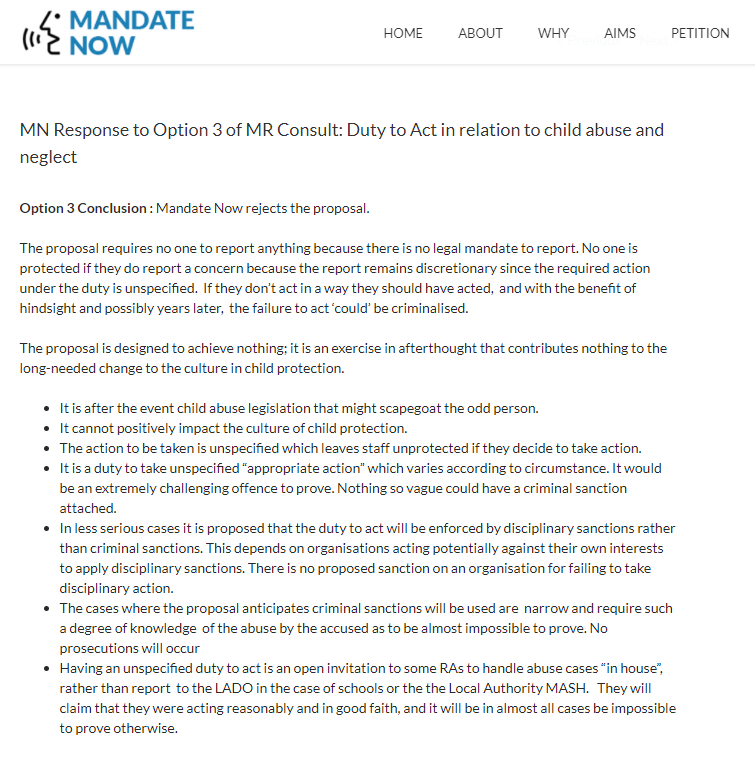
There’s a further point to consider. The likelihood of legislation designed to achieve Duty to Act having any hope of getting through the House of Commons is infinitesimally small. The proposal was a Home Office spoiler.
So where does this leave BSA?
It supports Duty to Act, its dysfunctional version of mandatory reporting and the status quo all at the same time!
In other words it supports ‘all the colours in all of the sizes’.
_______________
Public relations [Plural noun] : the professional maintenance of a favourable public image by a company or other organisation or a famous person.
